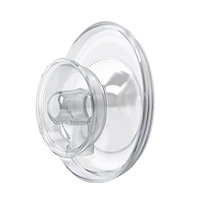Candles, bubble baths, personal boundaries, Kegels. What do all these things have in common? They’re all a valid form of self-care. At Elvie, we like to think of pelvic floor exercises as an important part of our routine for keeping a healthy body AND a healthy mind.
You might be thinking, how can Kegels and mental health possibly be connected? But when you think about it, it’s obvious. The benefits of a healthy pelvic floor are integral to our mental health.
How does your pelvic floor affect your mental health?
OK, quick PSA: women deserve to be able to meet friends for lunch/go jogging/bend down to tie up their shoes (delete as appropriate), and not worry about peeing themselves. But this is not the case for so many women. It’s estimated that 1.5 million people aged between 18-44 have experienced continence issues, so it’s also not just an older person’s problem. And what effect does this sort of physical problem have on your mental health?
Continence issues are looked at as physical issues, whether it’s suffering from incontinence or pelvic organ prolapse. But they can also take a massive toll on our mental health and wellbeing. These issues can be embarrassing and inconvenient for people who suffer, making daily life difficult and hard to predict. If you can’t be certain that you’re going to be able to control your bladder, you’ll be likely to cancel plans and alter your day-to-day life.
How does your mental health affect your pelvic floor?
Mental health and your pelvic floor are a two-way street – because stress can weaken our pelvic floor muscles. Suffering from stress can cause us to tense our muscles and everything else that comes with being stressed out. Tensing and tightening your muscles also includes your pelvic floor, whether you realize it or not. Although tensing and contracting your pelvic floor muscles are a vital part of performing Kegels and keeping your pelvic floor healthy, resting those muscles is vital also just as important. If you’re not resting your pelvic floor, it can lead to your muscles weakening, resulting in a range of different issues. Research has also found a strong correlation between experiencing stress and experiencing symptoms of urinary incontinence. So not only is lowering your stress levels vital to your mental wellbeing, but it’s also going to be good for your pelvic floor muscles. So download that meditation app, take time to read, meet your friends. Do whatever keeps you calm.
How can Kegels affect your mental health?
Like we mentioned earlier, suffering from incontinence or pelvic floor issues can negatively affect your mental health, even leading to serious mental illnesses like anxiety or depression. That’s why keeping your pelvic floor strong and healthy is so important – Kegel exercises will help prevent you from experiencing these issues and them harming your mental health.
Kegels are a great way of keeping your pelvic floor strong and healthy, plus they also count as exercise, and exercise can help improve mood and mental health. Without even putting on a sports bra! Working Kegels into your usual workout or exercise can be a great way of getting them into your routine. They’re relatively simple to do and only take up 5-10 minutes of your time. We’ve got some detailed information on Kegels and how to do them over in our post here.
Enter Elvie Trainer
We designed Elvie Trainer to be fun, challenging and motivating, so that you can get the most out of your Kegels. Elvie Trainer uses biofeedback technology, which is the most reliable way to encourage commitment and improve pelvic floor muscle training outcomes. So, strengthen and tone your pelvic floor (and look after your mental health while you’re at it) with the world's smallest and smartest Kegel trainer.










